Harmful Consumption Of Psychoactive Substances
VerifiedAdded on 2022/08/12
|12
|3509
|29
AI Summary
It is a continued case study, I had someone else do the last one and only received 80%. I need an A
Contribute Materials
Your contribution can guide someone’s learning journey. Share your
documents today.
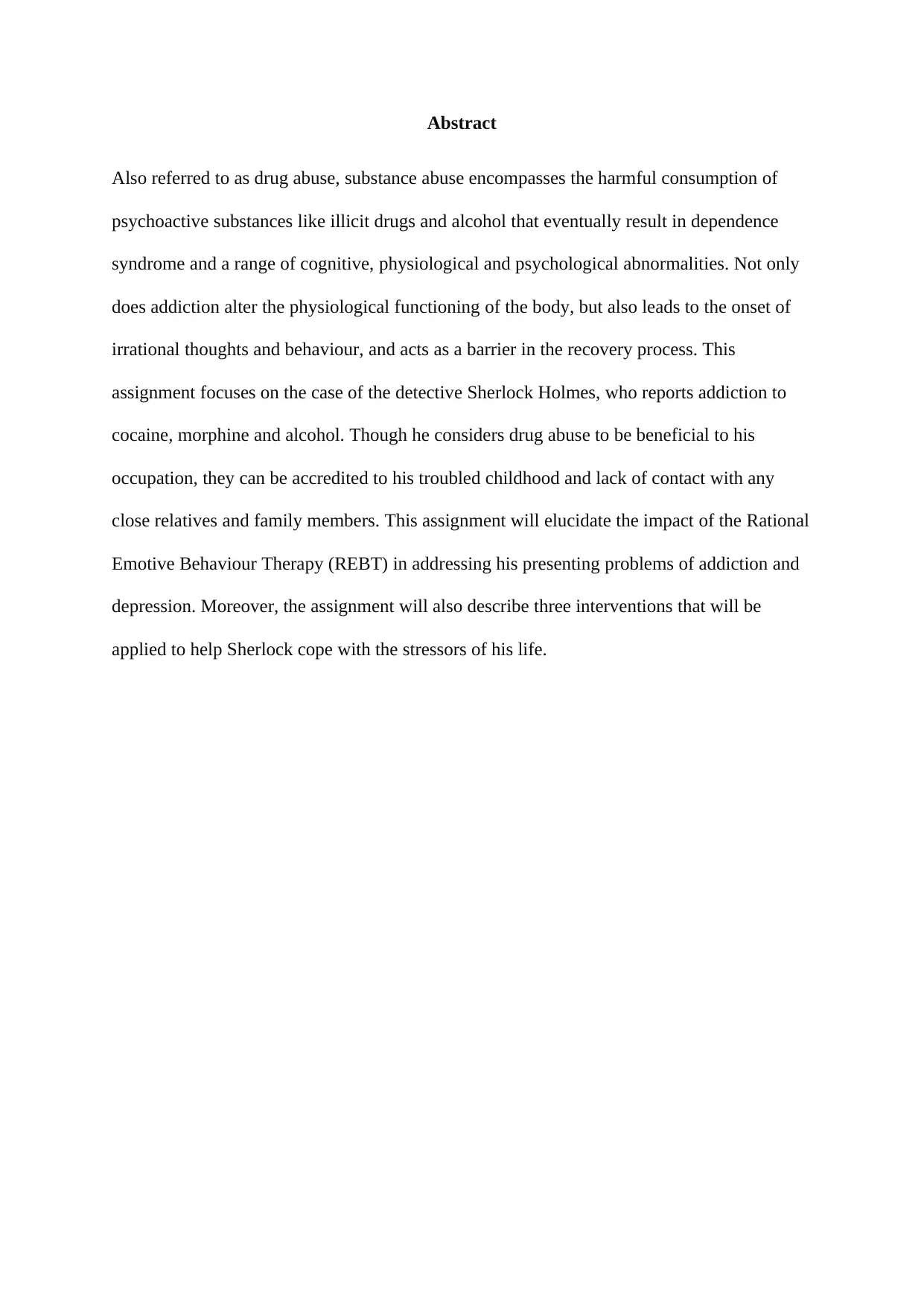
Abstract
Also referred to as drug abuse, substance abuse encompasses the harmful consumption of
psychoactive substances like illicit drugs and alcohol that eventually result in dependence
syndrome and a range of cognitive, physiological and psychological abnormalities. Not only
does addiction alter the physiological functioning of the body, but also leads to the onset of
irrational thoughts and behaviour, and acts as a barrier in the recovery process. This
assignment focuses on the case of the detective Sherlock Holmes, who reports addiction to
cocaine, morphine and alcohol. Though he considers drug abuse to be beneficial to his
occupation, they can be accredited to his troubled childhood and lack of contact with any
close relatives and family members. This assignment will elucidate the impact of the Rational
Emotive Behaviour Therapy (REBT) in addressing his presenting problems of addiction and
depression. Moreover, the assignment will also describe three interventions that will be
applied to help Sherlock cope with the stressors of his life.
Also referred to as drug abuse, substance abuse encompasses the harmful consumption of
psychoactive substances like illicit drugs and alcohol that eventually result in dependence
syndrome and a range of cognitive, physiological and psychological abnormalities. Not only
does addiction alter the physiological functioning of the body, but also leads to the onset of
irrational thoughts and behaviour, and acts as a barrier in the recovery process. This
assignment focuses on the case of the detective Sherlock Holmes, who reports addiction to
cocaine, morphine and alcohol. Though he considers drug abuse to be beneficial to his
occupation, they can be accredited to his troubled childhood and lack of contact with any
close relatives and family members. This assignment will elucidate the impact of the Rational
Emotive Behaviour Therapy (REBT) in addressing his presenting problems of addiction and
depression. Moreover, the assignment will also describe three interventions that will be
applied to help Sherlock cope with the stressors of his life.
Secure Best Marks with AI Grader
Need help grading? Try our AI Grader for instant feedback on your assignments.
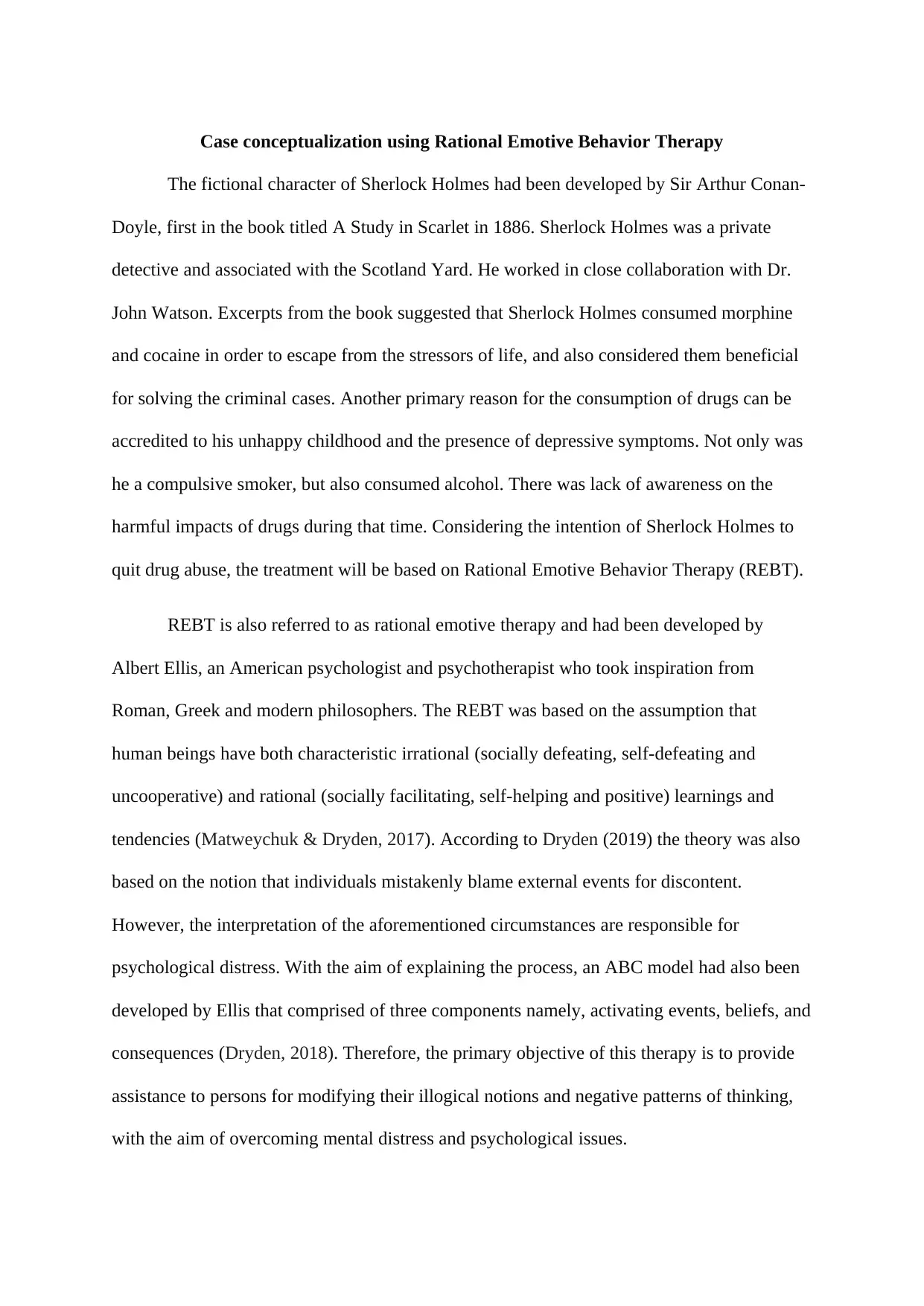
Case conceptualization using Rational Emotive Behavior Therapy
The fictional character of Sherlock Holmes had been developed by Sir Arthur Conan-
Doyle, first in the book titled A Study in Scarlet in 1886. Sherlock Holmes was a private
detective and associated with the Scotland Yard. He worked in close collaboration with Dr.
John Watson. Excerpts from the book suggested that Sherlock Holmes consumed morphine
and cocaine in order to escape from the stressors of life, and also considered them beneficial
for solving the criminal cases. Another primary reason for the consumption of drugs can be
accredited to his unhappy childhood and the presence of depressive symptoms. Not only was
he a compulsive smoker, but also consumed alcohol. There was lack of awareness on the
harmful impacts of drugs during that time. Considering the intention of Sherlock Holmes to
quit drug abuse, the treatment will be based on Rational Emotive Behavior Therapy (REBT).
REBT is also referred to as rational emotive therapy and had been developed by
Albert Ellis, an American psychologist and psychotherapist who took inspiration from
Roman, Greek and modern philosophers. The REBT was based on the assumption that
human beings have both characteristic irrational (socially defeating, self-defeating and
uncooperative) and rational (socially facilitating, self-helping and positive) learnings and
tendencies (Matweychuk & Dryden, 2017). According to Dryden (2019) the theory was also
based on the notion that individuals mistakenly blame external events for discontent.
However, the interpretation of the aforementioned circumstances are responsible for
psychological distress. With the aim of explaining the process, an ABC model had also been
developed by Ellis that comprised of three components namely, activating events, beliefs, and
consequences (Dryden, 2018). Therefore, the primary objective of this therapy is to provide
assistance to persons for modifying their illogical notions and negative patterns of thinking,
with the aim of overcoming mental distress and psychological issues.
The fictional character of Sherlock Holmes had been developed by Sir Arthur Conan-
Doyle, first in the book titled A Study in Scarlet in 1886. Sherlock Holmes was a private
detective and associated with the Scotland Yard. He worked in close collaboration with Dr.
John Watson. Excerpts from the book suggested that Sherlock Holmes consumed morphine
and cocaine in order to escape from the stressors of life, and also considered them beneficial
for solving the criminal cases. Another primary reason for the consumption of drugs can be
accredited to his unhappy childhood and the presence of depressive symptoms. Not only was
he a compulsive smoker, but also consumed alcohol. There was lack of awareness on the
harmful impacts of drugs during that time. Considering the intention of Sherlock Holmes to
quit drug abuse, the treatment will be based on Rational Emotive Behavior Therapy (REBT).
REBT is also referred to as rational emotive therapy and had been developed by
Albert Ellis, an American psychologist and psychotherapist who took inspiration from
Roman, Greek and modern philosophers. The REBT was based on the assumption that
human beings have both characteristic irrational (socially defeating, self-defeating and
uncooperative) and rational (socially facilitating, self-helping and positive) learnings and
tendencies (Matweychuk & Dryden, 2017). According to Dryden (2019) the theory was also
based on the notion that individuals mistakenly blame external events for discontent.
However, the interpretation of the aforementioned circumstances are responsible for
psychological distress. With the aim of explaining the process, an ABC model had also been
developed by Ellis that comprised of three components namely, activating events, beliefs, and
consequences (Dryden, 2018). Therefore, the primary objective of this therapy is to provide
assistance to persons for modifying their illogical notions and negative patterns of thinking,
with the aim of overcoming mental distress and psychological issues.
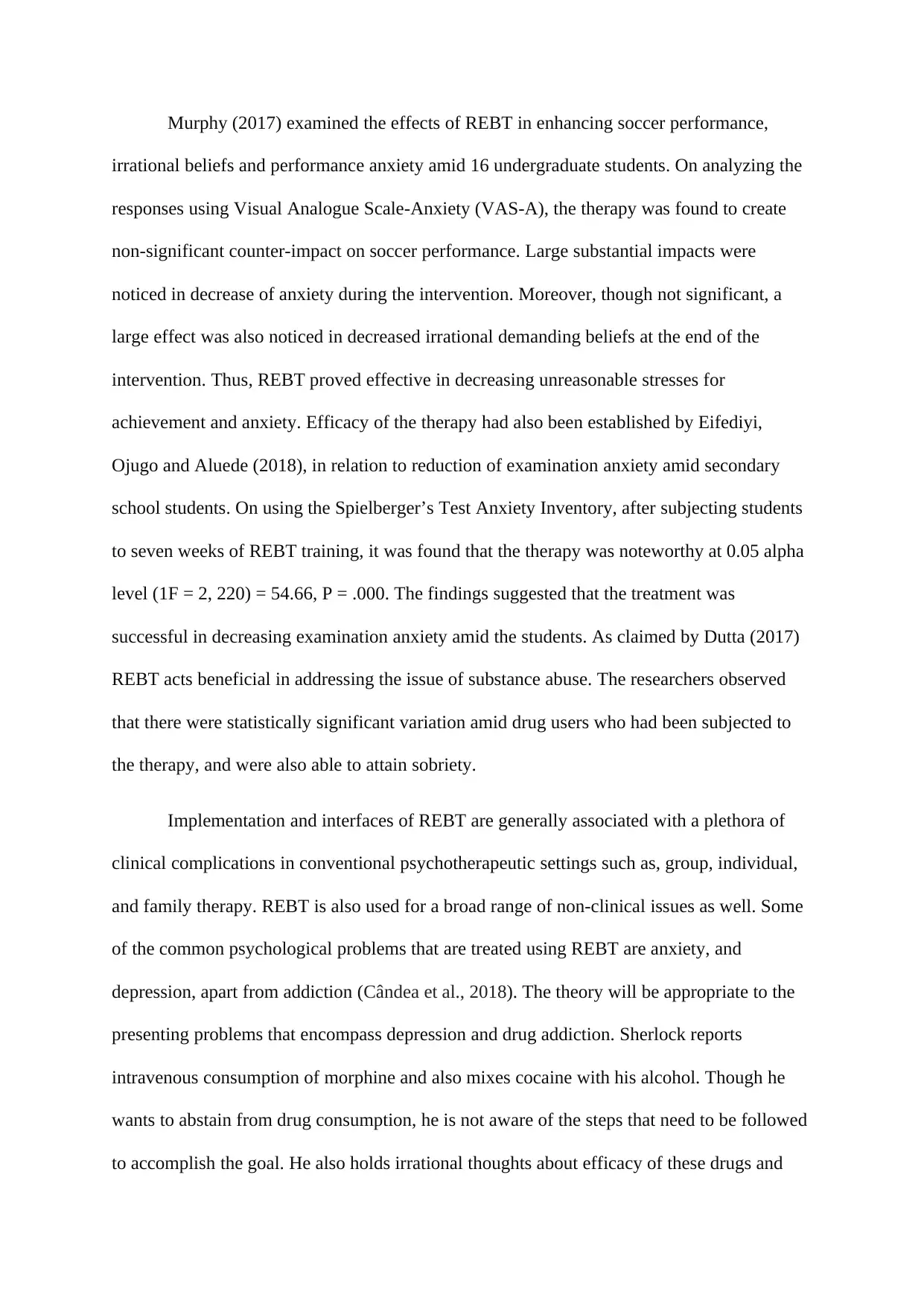
Murphy (2017) examined the effects of REBT in enhancing soccer performance,
irrational beliefs and performance anxiety amid 16 undergraduate students. On analyzing the
responses using Visual Analogue Scale-Anxiety (VAS-A), the therapy was found to create
non-significant counter-impact on soccer performance. Large substantial impacts were
noticed in decrease of anxiety during the intervention. Moreover, though not significant, a
large effect was also noticed in decreased irrational demanding beliefs at the end of the
intervention. Thus, REBT proved effective in decreasing unreasonable stresses for
achievement and anxiety. Efficacy of the therapy had also been established by Eifediyi,
Ojugo and Aluede (2018), in relation to reduction of examination anxiety amid secondary
school students. On using the Spielberger’s Test Anxiety Inventory, after subjecting students
to seven weeks of REBT training, it was found that the therapy was noteworthy at 0.05 alpha
level (1F = 2, 220) = 54.66, P = .000. The findings suggested that the treatment was
successful in decreasing examination anxiety amid the students. As claimed by Dutta (2017)
REBT acts beneficial in addressing the issue of substance abuse. The researchers observed
that there were statistically significant variation amid drug users who had been subjected to
the therapy, and were also able to attain sobriety.
Implementation and interfaces of REBT are generally associated with a plethora of
clinical complications in conventional psychotherapeutic settings such as, group, individual,
and family therapy. REBT is also used for a broad range of non-clinical issues as well. Some
of the common psychological problems that are treated using REBT are anxiety, and
depression, apart from addiction (Cândea et al., 2018). The theory will be appropriate to the
presenting problems that encompass depression and drug addiction. Sherlock reports
intravenous consumption of morphine and also mixes cocaine with his alcohol. Though he
wants to abstain from drug consumption, he is not aware of the steps that need to be followed
to accomplish the goal. He also holds irrational thoughts about efficacy of these drugs and
irrational beliefs and performance anxiety amid 16 undergraduate students. On analyzing the
responses using Visual Analogue Scale-Anxiety (VAS-A), the therapy was found to create
non-significant counter-impact on soccer performance. Large substantial impacts were
noticed in decrease of anxiety during the intervention. Moreover, though not significant, a
large effect was also noticed in decreased irrational demanding beliefs at the end of the
intervention. Thus, REBT proved effective in decreasing unreasonable stresses for
achievement and anxiety. Efficacy of the therapy had also been established by Eifediyi,
Ojugo and Aluede (2018), in relation to reduction of examination anxiety amid secondary
school students. On using the Spielberger’s Test Anxiety Inventory, after subjecting students
to seven weeks of REBT training, it was found that the therapy was noteworthy at 0.05 alpha
level (1F = 2, 220) = 54.66, P = .000. The findings suggested that the treatment was
successful in decreasing examination anxiety amid the students. As claimed by Dutta (2017)
REBT acts beneficial in addressing the issue of substance abuse. The researchers observed
that there were statistically significant variation amid drug users who had been subjected to
the therapy, and were also able to attain sobriety.
Implementation and interfaces of REBT are generally associated with a plethora of
clinical complications in conventional psychotherapeutic settings such as, group, individual,
and family therapy. REBT is also used for a broad range of non-clinical issues as well. Some
of the common psychological problems that are treated using REBT are anxiety, and
depression, apart from addiction (Cândea et al., 2018). The theory will be appropriate to the
presenting problems that encompass depression and drug addiction. Sherlock reports
intravenous consumption of morphine and also mixes cocaine with his alcohol. Though he
wants to abstain from drug consumption, he is not aware of the steps that need to be followed
to accomplish the goal. He also holds irrational thoughts about efficacy of these drugs and
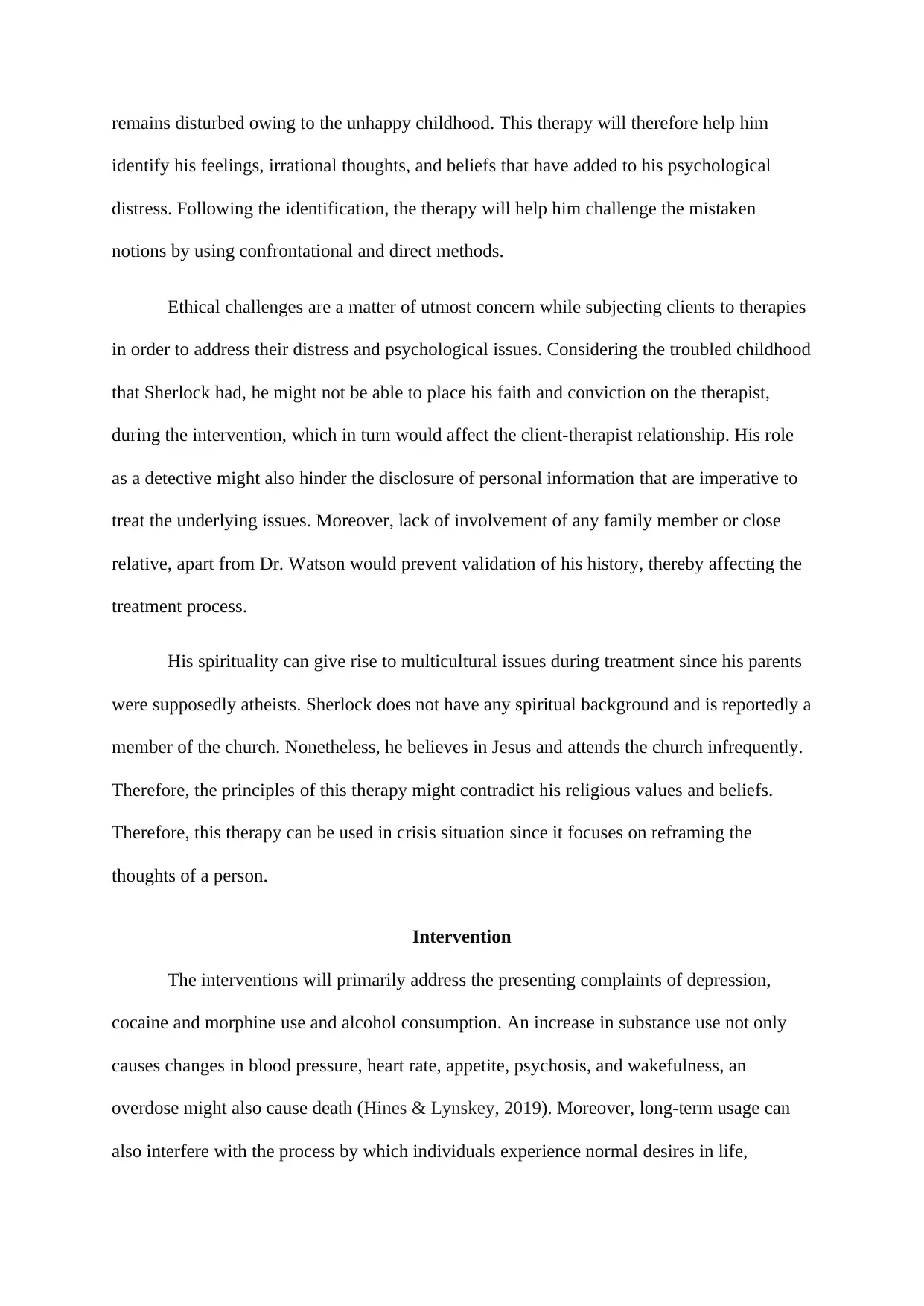
remains disturbed owing to the unhappy childhood. This therapy will therefore help him
identify his feelings, irrational thoughts, and beliefs that have added to his psychological
distress. Following the identification, the therapy will help him challenge the mistaken
notions by using confrontational and direct methods.
Ethical challenges are a matter of utmost concern while subjecting clients to therapies
in order to address their distress and psychological issues. Considering the troubled childhood
that Sherlock had, he might not be able to place his faith and conviction on the therapist,
during the intervention, which in turn would affect the client-therapist relationship. His role
as a detective might also hinder the disclosure of personal information that are imperative to
treat the underlying issues. Moreover, lack of involvement of any family member or close
relative, apart from Dr. Watson would prevent validation of his history, thereby affecting the
treatment process.
His spirituality can give rise to multicultural issues during treatment since his parents
were supposedly atheists. Sherlock does not have any spiritual background and is reportedly a
member of the church. Nonetheless, he believes in Jesus and attends the church infrequently.
Therefore, the principles of this therapy might contradict his religious values and beliefs.
Therefore, this therapy can be used in crisis situation since it focuses on reframing the
thoughts of a person.
Intervention
The interventions will primarily address the presenting complaints of depression,
cocaine and morphine use and alcohol consumption. An increase in substance use not only
causes changes in blood pressure, heart rate, appetite, psychosis, and wakefulness, an
overdose might also cause death (Hines & Lynskey, 2019). Moreover, long-term usage can
also interfere with the process by which individuals experience normal desires in life,
identify his feelings, irrational thoughts, and beliefs that have added to his psychological
distress. Following the identification, the therapy will help him challenge the mistaken
notions by using confrontational and direct methods.
Ethical challenges are a matter of utmost concern while subjecting clients to therapies
in order to address their distress and psychological issues. Considering the troubled childhood
that Sherlock had, he might not be able to place his faith and conviction on the therapist,
during the intervention, which in turn would affect the client-therapist relationship. His role
as a detective might also hinder the disclosure of personal information that are imperative to
treat the underlying issues. Moreover, lack of involvement of any family member or close
relative, apart from Dr. Watson would prevent validation of his history, thereby affecting the
treatment process.
His spirituality can give rise to multicultural issues during treatment since his parents
were supposedly atheists. Sherlock does not have any spiritual background and is reportedly a
member of the church. Nonetheless, he believes in Jesus and attends the church infrequently.
Therefore, the principles of this therapy might contradict his religious values and beliefs.
Therefore, this therapy can be used in crisis situation since it focuses on reframing the
thoughts of a person.
Intervention
The interventions will primarily address the presenting complaints of depression,
cocaine and morphine use and alcohol consumption. An increase in substance use not only
causes changes in blood pressure, heart rate, appetite, psychosis, and wakefulness, an
overdose might also cause death (Hines & Lynskey, 2019). Moreover, long-term usage can
also interfere with the process by which individuals experience normal desires in life,
Secure Best Marks with AI Grader
Need help grading? Try our AI Grader for instant feedback on your assignments.
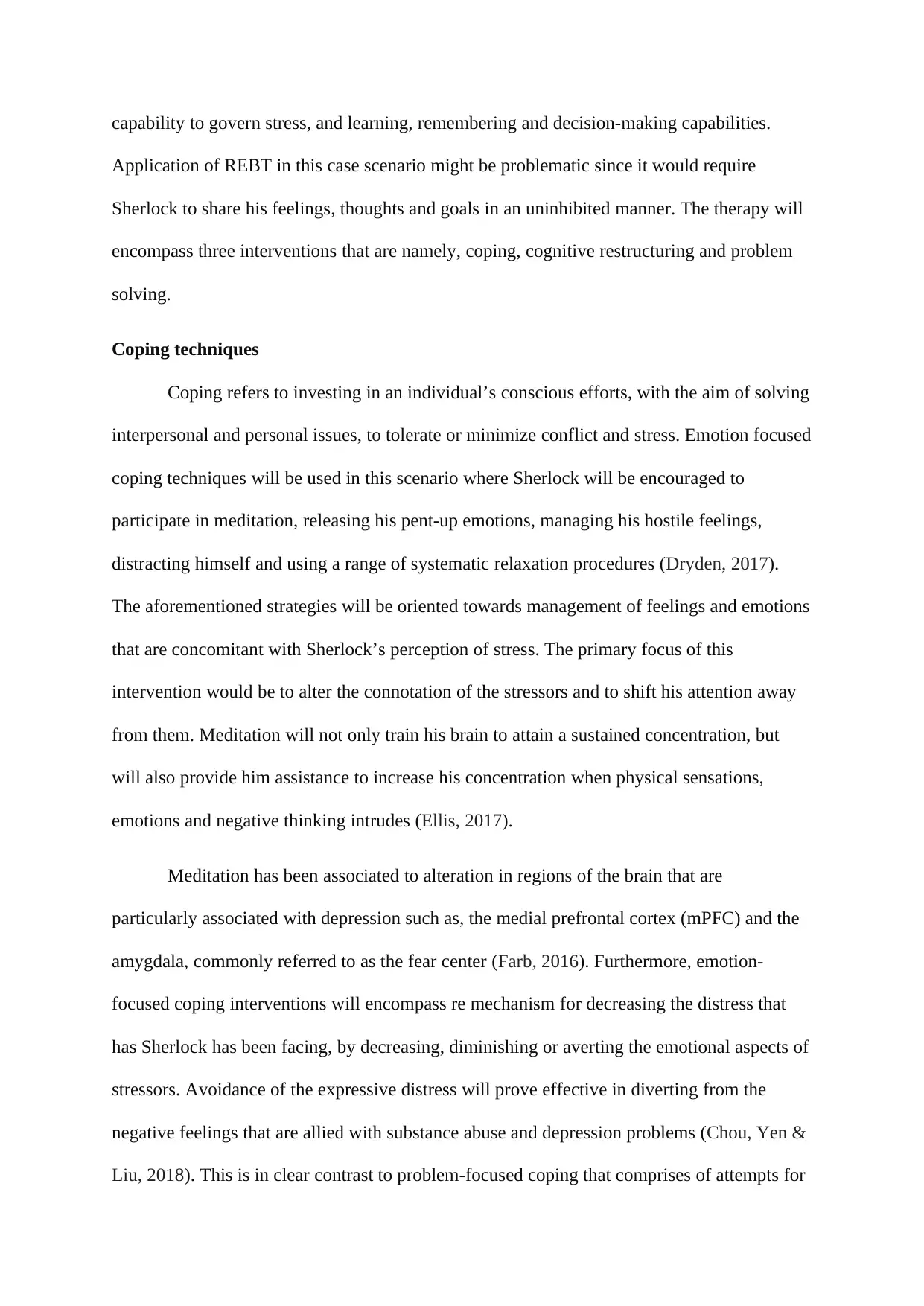
capability to govern stress, and learning, remembering and decision-making capabilities.
Application of REBT in this case scenario might be problematic since it would require
Sherlock to share his feelings, thoughts and goals in an uninhibited manner. The therapy will
encompass three interventions that are namely, coping, cognitive restructuring and problem
solving.
Coping techniques
Coping refers to investing in an individual’s conscious efforts, with the aim of solving
interpersonal and personal issues, to tolerate or minimize conflict and stress. Emotion focused
coping techniques will be used in this scenario where Sherlock will be encouraged to
participate in meditation, releasing his pent-up emotions, managing his hostile feelings,
distracting himself and using a range of systematic relaxation procedures (Dryden, 2017).
The aforementioned strategies will be oriented towards management of feelings and emotions
that are concomitant with Sherlock’s perception of stress. The primary focus of this
intervention would be to alter the connotation of the stressors and to shift his attention away
from them. Meditation will not only train his brain to attain a sustained concentration, but
will also provide him assistance to increase his concentration when physical sensations,
emotions and negative thinking intrudes (Ellis, 2017).
Meditation has been associated to alteration in regions of the brain that are
particularly associated with depression such as, the medial prefrontal cortex (mPFC) and the
amygdala, commonly referred to as the fear center (Farb, 2016). Furthermore, emotion-
focused coping interventions will encompass re mechanism for decreasing the distress that
has Sherlock has been facing, by decreasing, diminishing or averting the emotional aspects of
stressors. Avoidance of the expressive distress will prove effective in diverting from the
negative feelings that are allied with substance abuse and depression problems (Chou, Yen &
Liu, 2018). This is in clear contrast to problem-focused coping that comprises of attempts for
Application of REBT in this case scenario might be problematic since it would require
Sherlock to share his feelings, thoughts and goals in an uninhibited manner. The therapy will
encompass three interventions that are namely, coping, cognitive restructuring and problem
solving.
Coping techniques
Coping refers to investing in an individual’s conscious efforts, with the aim of solving
interpersonal and personal issues, to tolerate or minimize conflict and stress. Emotion focused
coping techniques will be used in this scenario where Sherlock will be encouraged to
participate in meditation, releasing his pent-up emotions, managing his hostile feelings,
distracting himself and using a range of systematic relaxation procedures (Dryden, 2017).
The aforementioned strategies will be oriented towards management of feelings and emotions
that are concomitant with Sherlock’s perception of stress. The primary focus of this
intervention would be to alter the connotation of the stressors and to shift his attention away
from them. Meditation will not only train his brain to attain a sustained concentration, but
will also provide him assistance to increase his concentration when physical sensations,
emotions and negative thinking intrudes (Ellis, 2017).
Meditation has been associated to alteration in regions of the brain that are
particularly associated with depression such as, the medial prefrontal cortex (mPFC) and the
amygdala, commonly referred to as the fear center (Farb, 2016). Furthermore, emotion-
focused coping interventions will encompass re mechanism for decreasing the distress that
has Sherlock has been facing, by decreasing, diminishing or averting the emotional aspects of
stressors. Avoidance of the expressive distress will prove effective in diverting from the
negative feelings that are allied with substance abuse and depression problems (Chou, Yen &
Liu, 2018). This is in clear contrast to problem-focused coping that comprises of attempts for
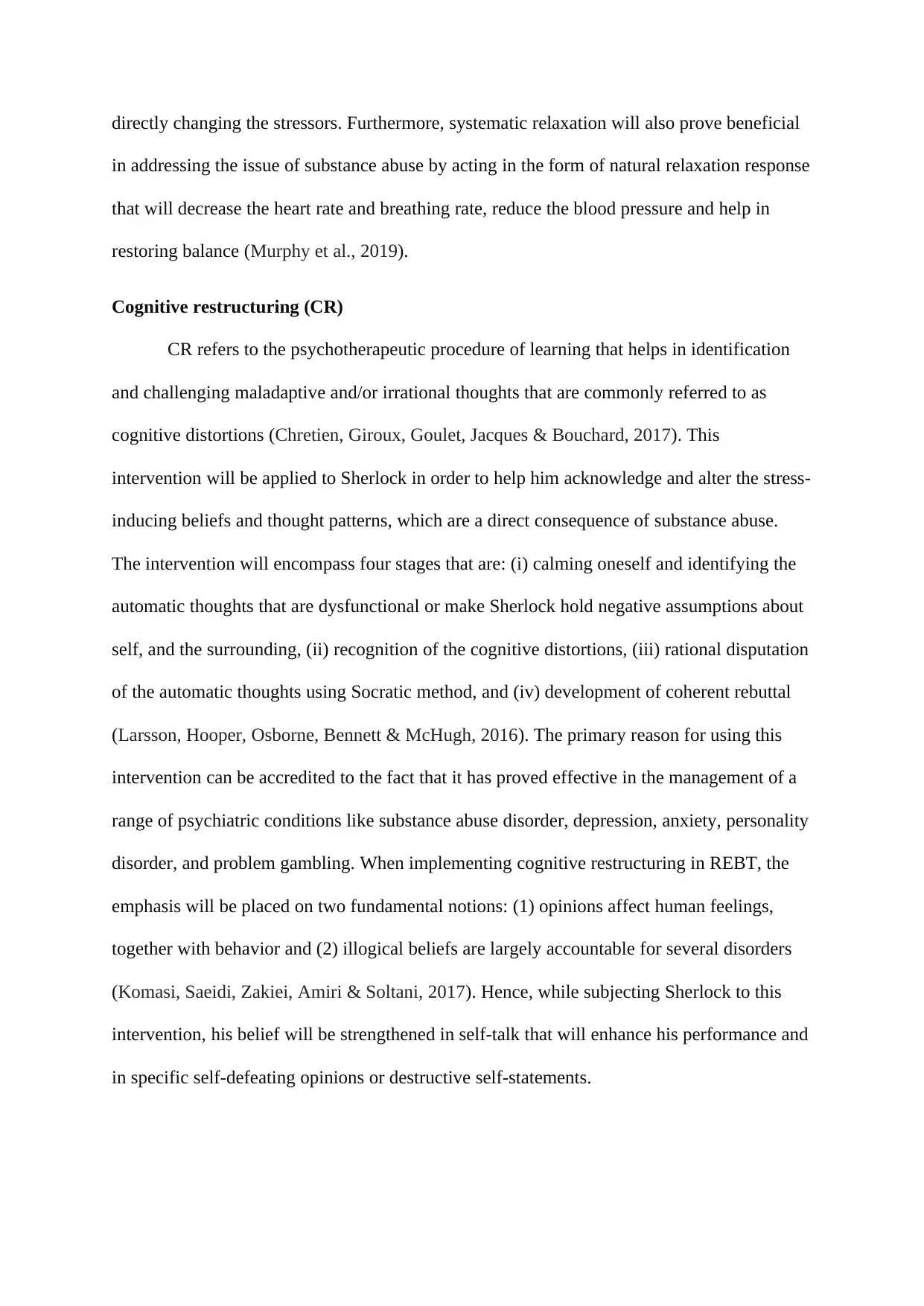
directly changing the stressors. Furthermore, systematic relaxation will also prove beneficial
in addressing the issue of substance abuse by acting in the form of natural relaxation response
that will decrease the heart rate and breathing rate, reduce the blood pressure and help in
restoring balance (Murphy et al., 2019).
Cognitive restructuring (CR)
CR refers to the psychotherapeutic procedure of learning that helps in identification
and challenging maladaptive and/or irrational thoughts that are commonly referred to as
cognitive distortions (Chretien, Giroux, Goulet, Jacques & Bouchard, 2017). This
intervention will be applied to Sherlock in order to help him acknowledge and alter the stress-
inducing beliefs and thought patterns, which are a direct consequence of substance abuse.
The intervention will encompass four stages that are: (i) calming oneself and identifying the
automatic thoughts that are dysfunctional or make Sherlock hold negative assumptions about
self, and the surrounding, (ii) recognition of the cognitive distortions, (iii) rational disputation
of the automatic thoughts using Socratic method, and (iv) development of coherent rebuttal
(Larsson, Hooper, Osborne, Bennett & McHugh, 2016). The primary reason for using this
intervention can be accredited to the fact that it has proved effective in the management of a
range of psychiatric conditions like substance abuse disorder, depression, anxiety, personality
disorder, and problem gambling. When implementing cognitive restructuring in REBT, the
emphasis will be placed on two fundamental notions: (1) opinions affect human feelings,
together with behavior and (2) illogical beliefs are largely accountable for several disorders
(Komasi, Saeidi, Zakiei, Amiri & Soltani, 2017). Hence, while subjecting Sherlock to this
intervention, his belief will be strengthened in self-talk that will enhance his performance and
in specific self-defeating opinions or destructive self-statements.
in addressing the issue of substance abuse by acting in the form of natural relaxation response
that will decrease the heart rate and breathing rate, reduce the blood pressure and help in
restoring balance (Murphy et al., 2019).
Cognitive restructuring (CR)
CR refers to the psychotherapeutic procedure of learning that helps in identification
and challenging maladaptive and/or irrational thoughts that are commonly referred to as
cognitive distortions (Chretien, Giroux, Goulet, Jacques & Bouchard, 2017). This
intervention will be applied to Sherlock in order to help him acknowledge and alter the stress-
inducing beliefs and thought patterns, which are a direct consequence of substance abuse.
The intervention will encompass four stages that are: (i) calming oneself and identifying the
automatic thoughts that are dysfunctional or make Sherlock hold negative assumptions about
self, and the surrounding, (ii) recognition of the cognitive distortions, (iii) rational disputation
of the automatic thoughts using Socratic method, and (iv) development of coherent rebuttal
(Larsson, Hooper, Osborne, Bennett & McHugh, 2016). The primary reason for using this
intervention can be accredited to the fact that it has proved effective in the management of a
range of psychiatric conditions like substance abuse disorder, depression, anxiety, personality
disorder, and problem gambling. When implementing cognitive restructuring in REBT, the
emphasis will be placed on two fundamental notions: (1) opinions affect human feelings,
together with behavior and (2) illogical beliefs are largely accountable for several disorders
(Komasi, Saeidi, Zakiei, Amiri & Soltani, 2017). Hence, while subjecting Sherlock to this
intervention, his belief will be strengthened in self-talk that will enhance his performance and
in specific self-defeating opinions or destructive self-statements.
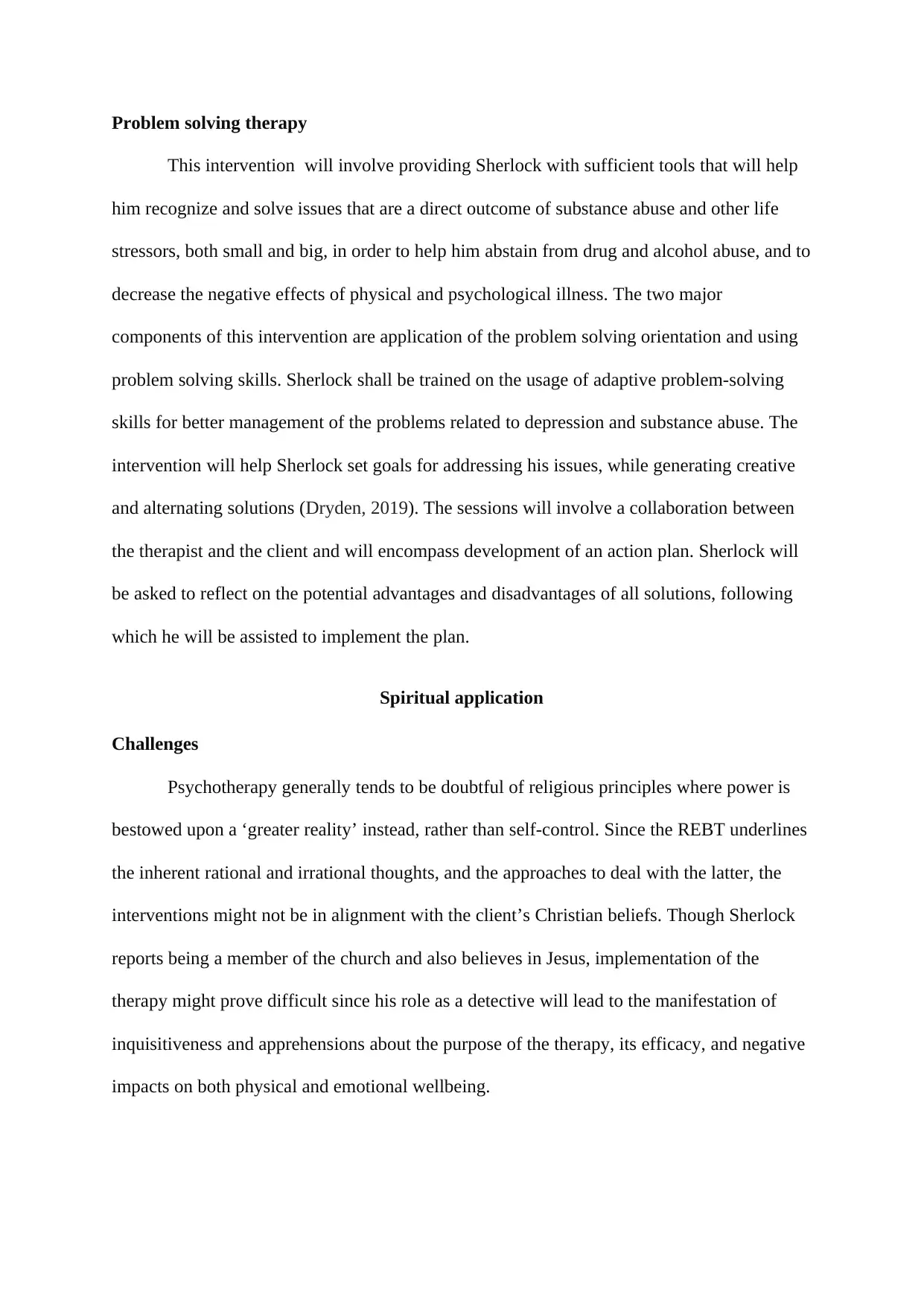
Problem solving therapy
This intervention will involve providing Sherlock with sufficient tools that will help
him recognize and solve issues that are a direct outcome of substance abuse and other life
stressors, both small and big, in order to help him abstain from drug and alcohol abuse, and to
decrease the negative effects of physical and psychological illness. The two major
components of this intervention are application of the problem solving orientation and using
problem solving skills. Sherlock shall be trained on the usage of adaptive problem-solving
skills for better management of the problems related to depression and substance abuse. The
intervention will help Sherlock set goals for addressing his issues, while generating creative
and alternating solutions (Dryden, 2019). The sessions will involve a collaboration between
the therapist and the client and will encompass development of an action plan. Sherlock will
be asked to reflect on the potential advantages and disadvantages of all solutions, following
which he will be assisted to implement the plan.
Spiritual application
Challenges
Psychotherapy generally tends to be doubtful of religious principles where power is
bestowed upon a ‘greater reality’ instead, rather than self-control. Since the REBT underlines
the inherent rational and irrational thoughts, and the approaches to deal with the latter, the
interventions might not be in alignment with the client’s Christian beliefs. Though Sherlock
reports being a member of the church and also believes in Jesus, implementation of the
therapy might prove difficult since his role as a detective will lead to the manifestation of
inquisitiveness and apprehensions about the purpose of the therapy, its efficacy, and negative
impacts on both physical and emotional wellbeing.
This intervention will involve providing Sherlock with sufficient tools that will help
him recognize and solve issues that are a direct outcome of substance abuse and other life
stressors, both small and big, in order to help him abstain from drug and alcohol abuse, and to
decrease the negative effects of physical and psychological illness. The two major
components of this intervention are application of the problem solving orientation and using
problem solving skills. Sherlock shall be trained on the usage of adaptive problem-solving
skills for better management of the problems related to depression and substance abuse. The
intervention will help Sherlock set goals for addressing his issues, while generating creative
and alternating solutions (Dryden, 2019). The sessions will involve a collaboration between
the therapist and the client and will encompass development of an action plan. Sherlock will
be asked to reflect on the potential advantages and disadvantages of all solutions, following
which he will be assisted to implement the plan.
Spiritual application
Challenges
Psychotherapy generally tends to be doubtful of religious principles where power is
bestowed upon a ‘greater reality’ instead, rather than self-control. Since the REBT underlines
the inherent rational and irrational thoughts, and the approaches to deal with the latter, the
interventions might not be in alignment with the client’s Christian beliefs. Though Sherlock
reports being a member of the church and also believes in Jesus, implementation of the
therapy might prove difficult since his role as a detective will lead to the manifestation of
inquisitiveness and apprehensions about the purpose of the therapy, its efficacy, and negative
impacts on both physical and emotional wellbeing.
Paraphrase This Document
Need a fresh take? Get an instant paraphrase of this document with our AI Paraphraser
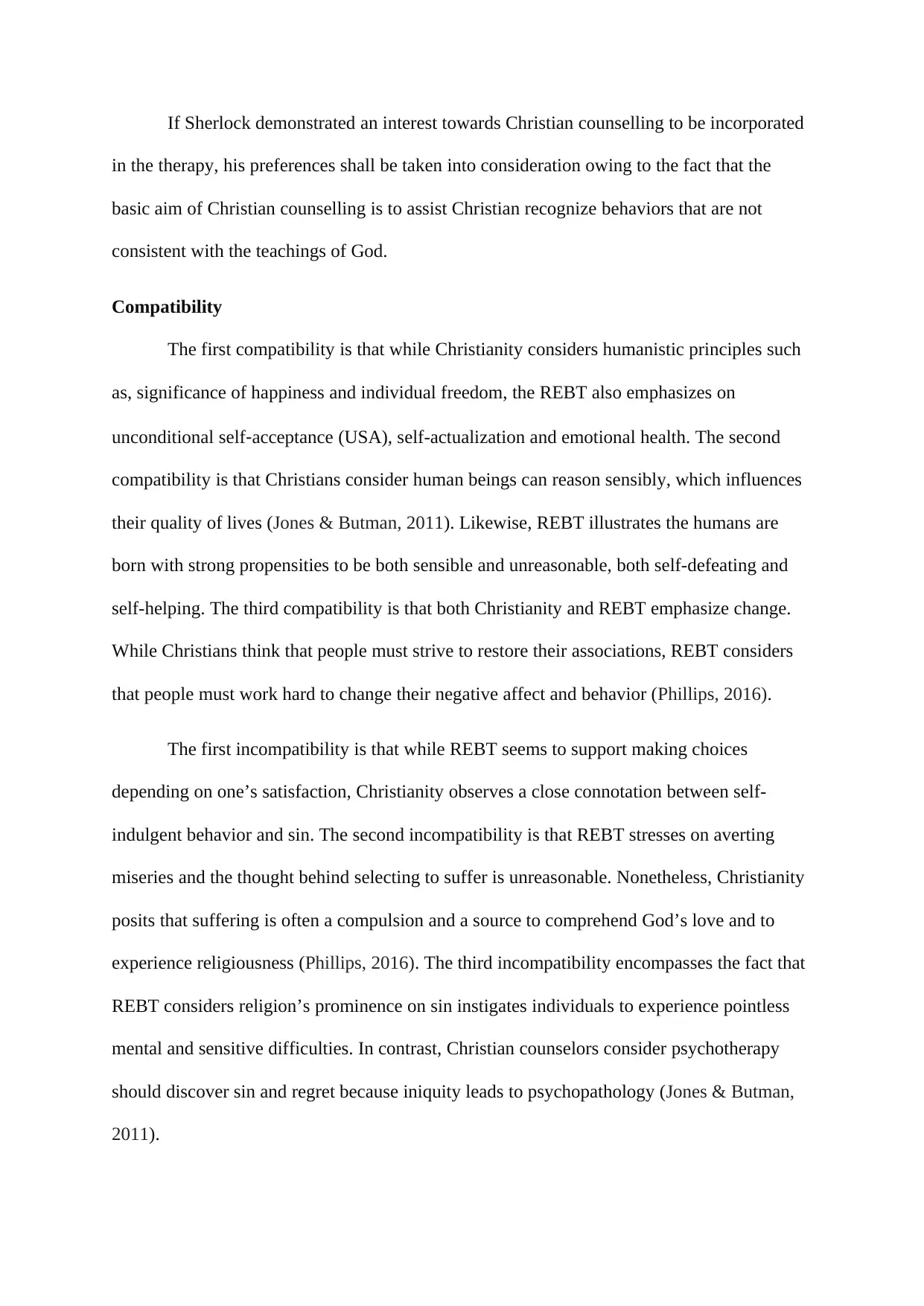
If Sherlock demonstrated an interest towards Christian counselling to be incorporated
in the therapy, his preferences shall be taken into consideration owing to the fact that the
basic aim of Christian counselling is to assist Christian recognize behaviors that are not
consistent with the teachings of God.
Compatibility
The first compatibility is that while Christianity considers humanistic principles such
as, significance of happiness and individual freedom, the REBT also emphasizes on
unconditional self‐acceptance (USA), self-actualization and emotional health. The second
compatibility is that Christians consider human beings can reason sensibly, which influences
their quality of lives (Jones & Butman, 2011). Likewise, REBT illustrates the humans are
born with strong propensities to be both sensible and unreasonable, both self-defeating and
self-helping. The third compatibility is that both Christianity and REBT emphasize change.
While Christians think that people must strive to restore their associations, REBT considers
that people must work hard to change their negative affect and behavior (Phillips, 2016).
The first incompatibility is that while REBT seems to support making choices
depending on one’s satisfaction, Christianity observes a close connotation between self-
indulgent behavior and sin. The second incompatibility is that REBT stresses on averting
miseries and the thought behind selecting to suffer is unreasonable. Nonetheless, Christianity
posits that suffering is often a compulsion and a source to comprehend God’s love and to
experience religiousness (Phillips, 2016). The third incompatibility encompasses the fact that
REBT considers religion’s prominence on sin instigates individuals to experience pointless
mental and sensitive difficulties. In contrast, Christian counselors consider psychotherapy
should discover sin and regret because iniquity leads to psychopathology (Jones & Butman,
2011).
in the therapy, his preferences shall be taken into consideration owing to the fact that the
basic aim of Christian counselling is to assist Christian recognize behaviors that are not
consistent with the teachings of God.
Compatibility
The first compatibility is that while Christianity considers humanistic principles such
as, significance of happiness and individual freedom, the REBT also emphasizes on
unconditional self‐acceptance (USA), self-actualization and emotional health. The second
compatibility is that Christians consider human beings can reason sensibly, which influences
their quality of lives (Jones & Butman, 2011). Likewise, REBT illustrates the humans are
born with strong propensities to be both sensible and unreasonable, both self-defeating and
self-helping. The third compatibility is that both Christianity and REBT emphasize change.
While Christians think that people must strive to restore their associations, REBT considers
that people must work hard to change their negative affect and behavior (Phillips, 2016).
The first incompatibility is that while REBT seems to support making choices
depending on one’s satisfaction, Christianity observes a close connotation between self-
indulgent behavior and sin. The second incompatibility is that REBT stresses on averting
miseries and the thought behind selecting to suffer is unreasonable. Nonetheless, Christianity
posits that suffering is often a compulsion and a source to comprehend God’s love and to
experience religiousness (Phillips, 2016). The third incompatibility encompasses the fact that
REBT considers religion’s prominence on sin instigates individuals to experience pointless
mental and sensitive difficulties. In contrast, Christian counselors consider psychotherapy
should discover sin and regret because iniquity leads to psychopathology (Jones & Butman,
2011).
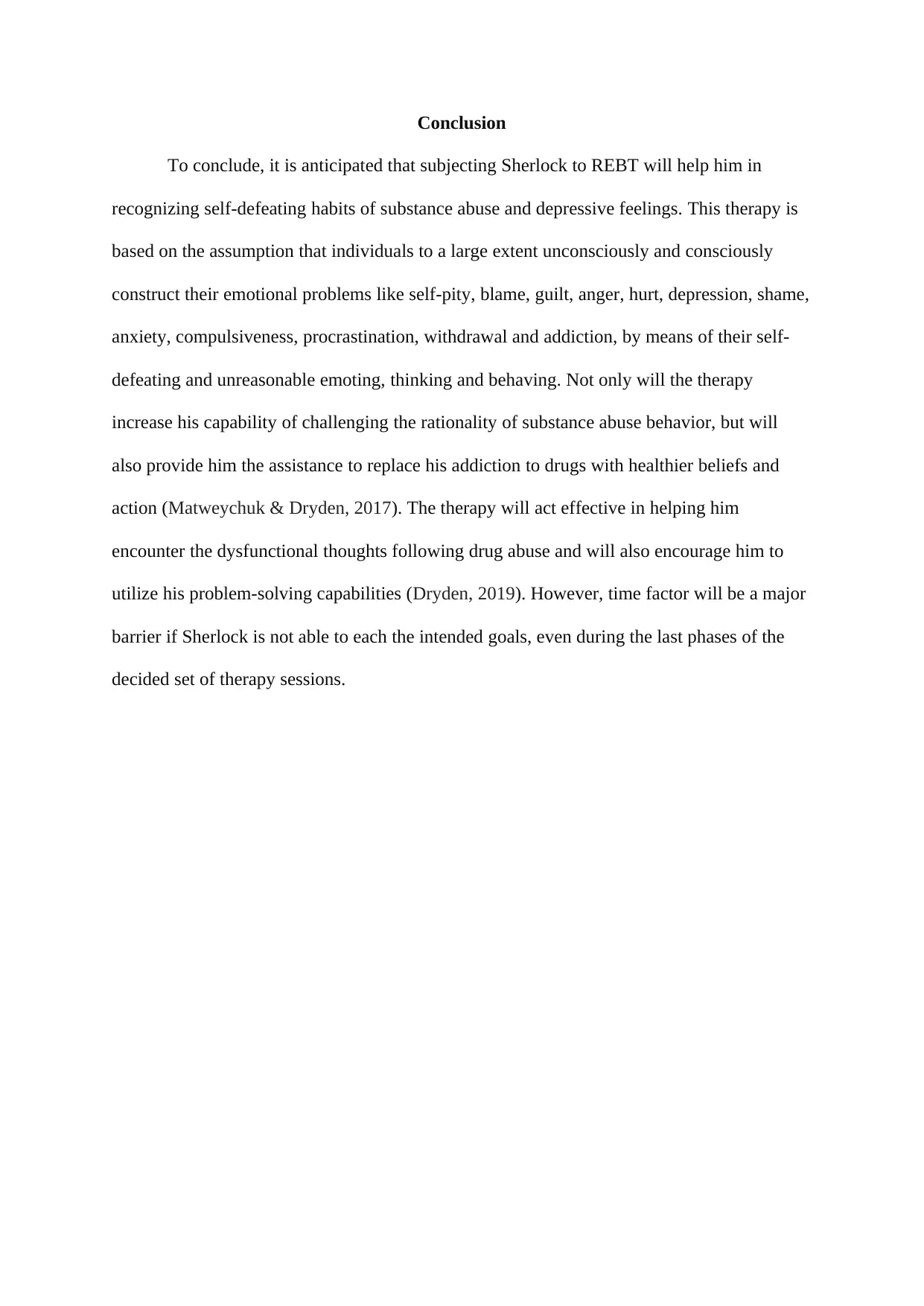
Conclusion
To conclude, it is anticipated that subjecting Sherlock to REBT will help him in
recognizing self-defeating habits of substance abuse and depressive feelings. This therapy is
based on the assumption that individuals to a large extent unconsciously and consciously
construct their emotional problems like self-pity, blame, guilt, anger, hurt, depression, shame,
anxiety, compulsiveness, procrastination, withdrawal and addiction, by means of their self-
defeating and unreasonable emoting, thinking and behaving. Not only will the therapy
increase his capability of challenging the rationality of substance abuse behavior, but will
also provide him the assistance to replace his addiction to drugs with healthier beliefs and
action (Matweychuk & Dryden, 2017). The therapy will act effective in helping him
encounter the dysfunctional thoughts following drug abuse and will also encourage him to
utilize his problem-solving capabilities (Dryden, 2019). However, time factor will be a major
barrier if Sherlock is not able to each the intended goals, even during the last phases of the
decided set of therapy sessions.
To conclude, it is anticipated that subjecting Sherlock to REBT will help him in
recognizing self-defeating habits of substance abuse and depressive feelings. This therapy is
based on the assumption that individuals to a large extent unconsciously and consciously
construct their emotional problems like self-pity, blame, guilt, anger, hurt, depression, shame,
anxiety, compulsiveness, procrastination, withdrawal and addiction, by means of their self-
defeating and unreasonable emoting, thinking and behaving. Not only will the therapy
increase his capability of challenging the rationality of substance abuse behavior, but will
also provide him the assistance to replace his addiction to drugs with healthier beliefs and
action (Matweychuk & Dryden, 2017). The therapy will act effective in helping him
encounter the dysfunctional thoughts following drug abuse and will also encourage him to
utilize his problem-solving capabilities (Dryden, 2019). However, time factor will be a major
barrier if Sherlock is not able to each the intended goals, even during the last phases of the
decided set of therapy sessions.
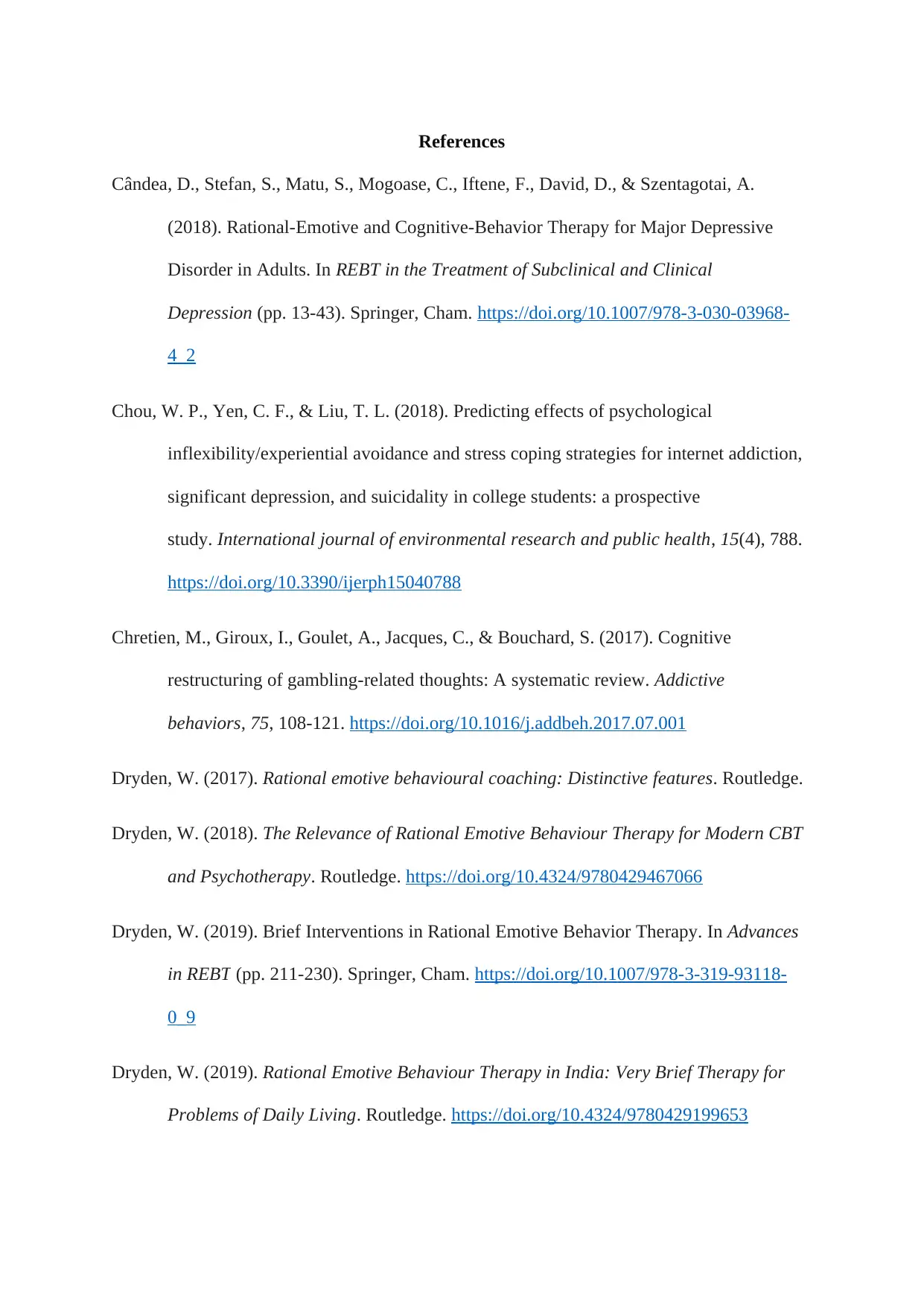
References
Cândea, D., Stefan, S., Matu, S., Mogoase, C., Iftene, F., David, D., & Szentagotai, A.
(2018). Rational-Emotive and Cognitive-Behavior Therapy for Major Depressive
Disorder in Adults. In REBT in the Treatment of Subclinical and Clinical
Depression (pp. 13-43). Springer, Cham. https://doi.org/10.1007/978-3-030-03968-
4_2
Chou, W. P., Yen, C. F., & Liu, T. L. (2018). Predicting effects of psychological
inflexibility/experiential avoidance and stress coping strategies for internet addiction,
significant depression, and suicidality in college students: a prospective
study. International journal of environmental research and public health, 15(4), 788.
https://doi.org/10.3390/ijerph15040788
Chretien, M., Giroux, I., Goulet, A., Jacques, C., & Bouchard, S. (2017). Cognitive
restructuring of gambling-related thoughts: A systematic review. Addictive
behaviors, 75, 108-121. https://doi.org/10.1016/j.addbeh.2017.07.001
Dryden, W. (2017). Rational emotive behavioural coaching: Distinctive features. Routledge.
Dryden, W. (2018). The Relevance of Rational Emotive Behaviour Therapy for Modern CBT
and Psychotherapy. Routledge. https://doi.org/10.4324/9780429467066
Dryden, W. (2019). Brief Interventions in Rational Emotive Behavior Therapy. In Advances
in REBT (pp. 211-230). Springer, Cham. https://doi.org/10.1007/978-3-319-93118-
0_9
Dryden, W. (2019). Rational Emotive Behaviour Therapy in India: Very Brief Therapy for
Problems of Daily Living. Routledge. https://doi.org/10.4324/9780429199653
Cândea, D., Stefan, S., Matu, S., Mogoase, C., Iftene, F., David, D., & Szentagotai, A.
(2018). Rational-Emotive and Cognitive-Behavior Therapy for Major Depressive
Disorder in Adults. In REBT in the Treatment of Subclinical and Clinical
Depression (pp. 13-43). Springer, Cham. https://doi.org/10.1007/978-3-030-03968-
4_2
Chou, W. P., Yen, C. F., & Liu, T. L. (2018). Predicting effects of psychological
inflexibility/experiential avoidance and stress coping strategies for internet addiction,
significant depression, and suicidality in college students: a prospective
study. International journal of environmental research and public health, 15(4), 788.
https://doi.org/10.3390/ijerph15040788
Chretien, M., Giroux, I., Goulet, A., Jacques, C., & Bouchard, S. (2017). Cognitive
restructuring of gambling-related thoughts: A systematic review. Addictive
behaviors, 75, 108-121. https://doi.org/10.1016/j.addbeh.2017.07.001
Dryden, W. (2017). Rational emotive behavioural coaching: Distinctive features. Routledge.
Dryden, W. (2018). The Relevance of Rational Emotive Behaviour Therapy for Modern CBT
and Psychotherapy. Routledge. https://doi.org/10.4324/9780429467066
Dryden, W. (2019). Brief Interventions in Rational Emotive Behavior Therapy. In Advances
in REBT (pp. 211-230). Springer, Cham. https://doi.org/10.1007/978-3-319-93118-
0_9
Dryden, W. (2019). Rational Emotive Behaviour Therapy in India: Very Brief Therapy for
Problems of Daily Living. Routledge. https://doi.org/10.4324/9780429199653
Secure Best Marks with AI Grader
Need help grading? Try our AI Grader for instant feedback on your assignments.
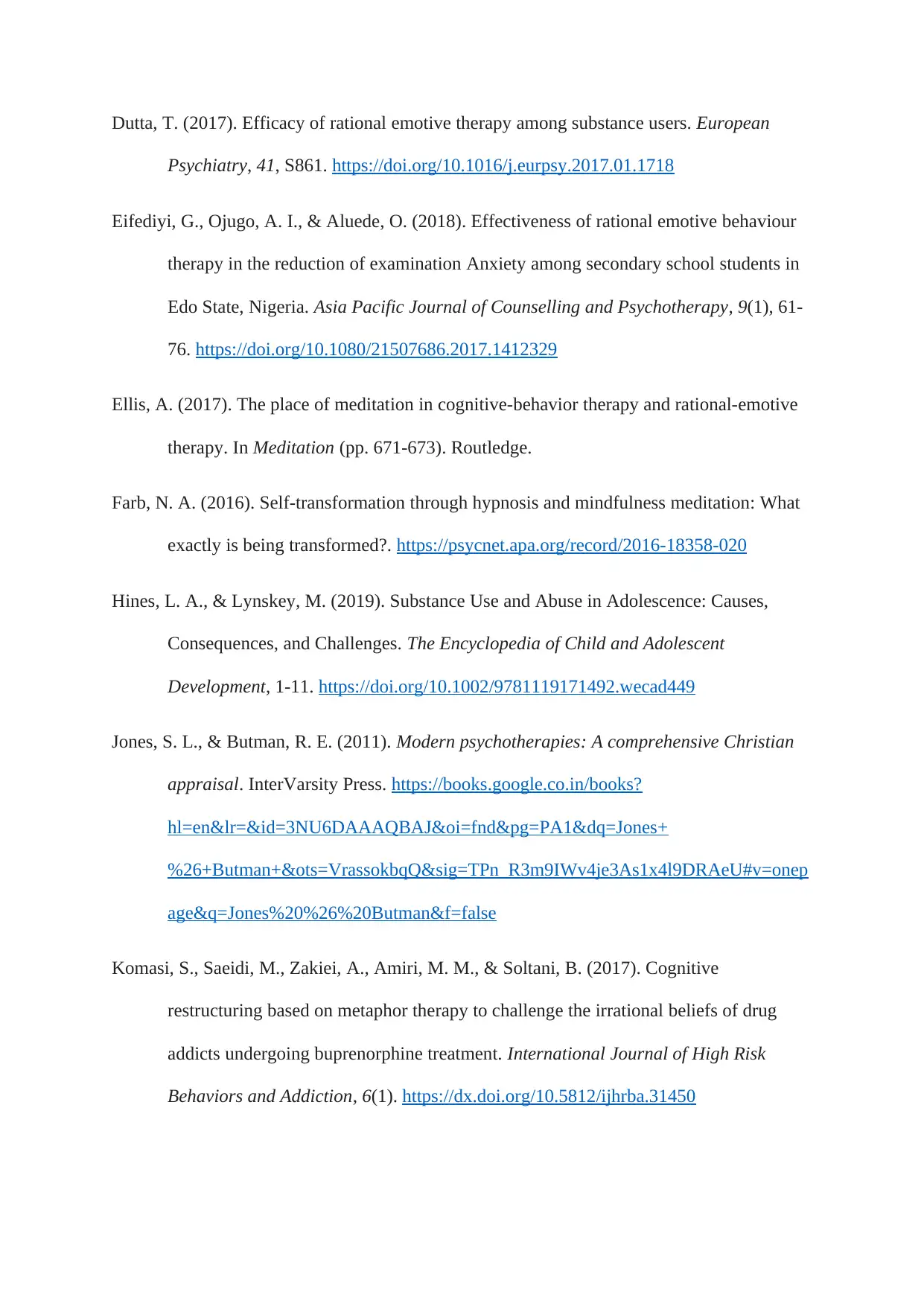
Dutta, T. (2017). Efficacy of rational emotive therapy among substance users. European
Psychiatry, 41, S861. https://doi.org/10.1016/j.eurpsy.2017.01.1718
Eifediyi, G., Ojugo, A. I., & Aluede, O. (2018). Effectiveness of rational emotive behaviour
therapy in the reduction of examination Anxiety among secondary school students in
Edo State, Nigeria. Asia Pacific Journal of Counselling and Psychotherapy, 9(1), 61-
76. https://doi.org/10.1080/21507686.2017.1412329
Ellis, A. (2017). The place of meditation in cognitive-behavior therapy and rational-emotive
therapy. In Meditation (pp. 671-673). Routledge.
Farb, N. A. (2016). Self-transformation through hypnosis and mindfulness meditation: What
exactly is being transformed?. https://psycnet.apa.org/record/2016-18358-020
Hines, L. A., & Lynskey, M. (2019). Substance Use and Abuse in Adolescence: Causes,
Consequences, and Challenges. The Encyclopedia of Child and Adolescent
Development, 1-11. https://doi.org/10.1002/9781119171492.wecad449
Jones, S. L., & Butman, R. E. (2011). Modern psychotherapies: A comprehensive Christian
appraisal. InterVarsity Press. https://books.google.co.in/books?
hl=en&lr=&id=3NU6DAAAQBAJ&oi=fnd&pg=PA1&dq=Jones+
%26+Butman+&ots=VrassokbqQ&sig=TPn_R3m9IWv4je3As1x4l9DRAeU#v=onep
age&q=Jones%20%26%20Butman&f=false
Komasi, S., Saeidi, M., Zakiei, A., Amiri, M. M., & Soltani, B. (2017). Cognitive
restructuring based on metaphor therapy to challenge the irrational beliefs of drug
addicts undergoing buprenorphine treatment. International Journal of High Risk
Behaviors and Addiction, 6(1). https://dx.doi.org/10.5812/ijhrba.31450
Psychiatry, 41, S861. https://doi.org/10.1016/j.eurpsy.2017.01.1718
Eifediyi, G., Ojugo, A. I., & Aluede, O. (2018). Effectiveness of rational emotive behaviour
therapy in the reduction of examination Anxiety among secondary school students in
Edo State, Nigeria. Asia Pacific Journal of Counselling and Psychotherapy, 9(1), 61-
76. https://doi.org/10.1080/21507686.2017.1412329
Ellis, A. (2017). The place of meditation in cognitive-behavior therapy and rational-emotive
therapy. In Meditation (pp. 671-673). Routledge.
Farb, N. A. (2016). Self-transformation through hypnosis and mindfulness meditation: What
exactly is being transformed?. https://psycnet.apa.org/record/2016-18358-020
Hines, L. A., & Lynskey, M. (2019). Substance Use and Abuse in Adolescence: Causes,
Consequences, and Challenges. The Encyclopedia of Child and Adolescent
Development, 1-11. https://doi.org/10.1002/9781119171492.wecad449
Jones, S. L., & Butman, R. E. (2011). Modern psychotherapies: A comprehensive Christian
appraisal. InterVarsity Press. https://books.google.co.in/books?
hl=en&lr=&id=3NU6DAAAQBAJ&oi=fnd&pg=PA1&dq=Jones+
%26+Butman+&ots=VrassokbqQ&sig=TPn_R3m9IWv4je3As1x4l9DRAeU#v=onep
age&q=Jones%20%26%20Butman&f=false
Komasi, S., Saeidi, M., Zakiei, A., Amiri, M. M., & Soltani, B. (2017). Cognitive
restructuring based on metaphor therapy to challenge the irrational beliefs of drug
addicts undergoing buprenorphine treatment. International Journal of High Risk
Behaviors and Addiction, 6(1). https://dx.doi.org/10.5812/ijhrba.31450
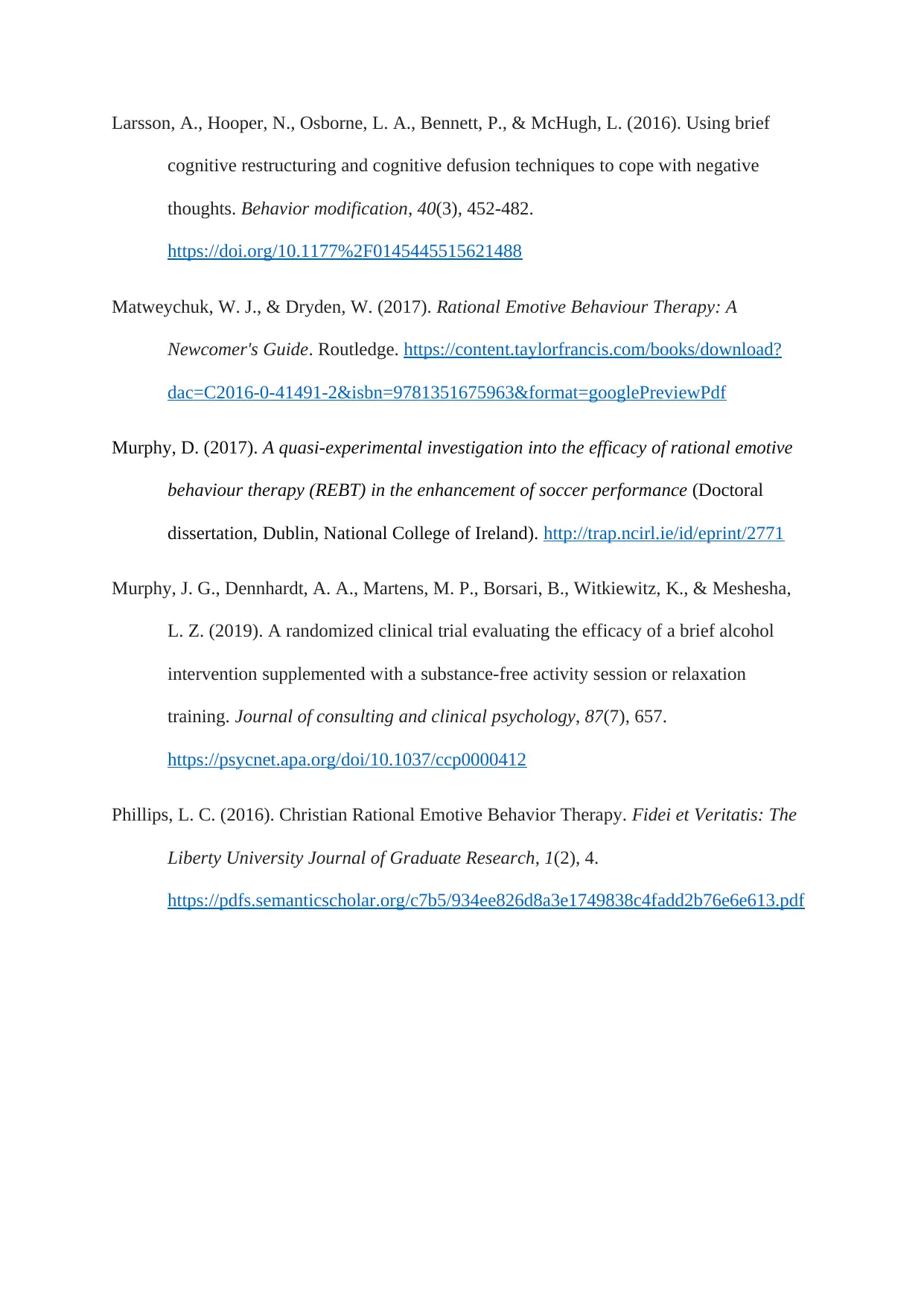
Larsson, A., Hooper, N., Osborne, L. A., Bennett, P., & McHugh, L. (2016). Using brief
cognitive restructuring and cognitive defusion techniques to cope with negative
thoughts. Behavior modification, 40(3), 452-482.
https://doi.org/10.1177%2F0145445515621488
Matweychuk, W. J., & Dryden, W. (2017). Rational Emotive Behaviour Therapy: A
Newcomer's Guide. Routledge. https://content.taylorfrancis.com/books/download?
dac=C2016-0-41491-2&isbn=9781351675963&format=googlePreviewPdf
Murphy, D. (2017). A quasi-experimental investigation into the efficacy of rational emotive
behaviour therapy (REBT) in the enhancement of soccer performance (Doctoral
dissertation, Dublin, National College of Ireland). http://trap.ncirl.ie/id/eprint/2771
Murphy, J. G., Dennhardt, A. A., Martens, M. P., Borsari, B., Witkiewitz, K., & Meshesha,
L. Z. (2019). A randomized clinical trial evaluating the efficacy of a brief alcohol
intervention supplemented with a substance-free activity session or relaxation
training. Journal of consulting and clinical psychology, 87(7), 657.
https://psycnet.apa.org/doi/10.1037/ccp0000412
Phillips, L. C. (2016). Christian Rational Emotive Behavior Therapy. Fidei et Veritatis: The
Liberty University Journal of Graduate Research, 1(2), 4.
https://pdfs.semanticscholar.org/c7b5/934ee826d8a3e1749838c4fadd2b76e6e613.pdf
cognitive restructuring and cognitive defusion techniques to cope with negative
thoughts. Behavior modification, 40(3), 452-482.
https://doi.org/10.1177%2F0145445515621488
Matweychuk, W. J., & Dryden, W. (2017). Rational Emotive Behaviour Therapy: A
Newcomer's Guide. Routledge. https://content.taylorfrancis.com/books/download?
dac=C2016-0-41491-2&isbn=9781351675963&format=googlePreviewPdf
Murphy, D. (2017). A quasi-experimental investigation into the efficacy of rational emotive
behaviour therapy (REBT) in the enhancement of soccer performance (Doctoral
dissertation, Dublin, National College of Ireland). http://trap.ncirl.ie/id/eprint/2771
Murphy, J. G., Dennhardt, A. A., Martens, M. P., Borsari, B., Witkiewitz, K., & Meshesha,
L. Z. (2019). A randomized clinical trial evaluating the efficacy of a brief alcohol
intervention supplemented with a substance-free activity session or relaxation
training. Journal of consulting and clinical psychology, 87(7), 657.
https://psycnet.apa.org/doi/10.1037/ccp0000412
Phillips, L. C. (2016). Christian Rational Emotive Behavior Therapy. Fidei et Veritatis: The
Liberty University Journal of Graduate Research, 1(2), 4.
https://pdfs.semanticscholar.org/c7b5/934ee826d8a3e1749838c4fadd2b76e6e613.pdf
1 out of 12
Related Documents
Your All-in-One AI-Powered Toolkit for Academic Success.
+13062052269
info@desklib.com
Available 24*7 on WhatsApp / Email
![[object Object]](/_next/static/media/star-bottom.7253800d.svg)
Unlock your academic potential
© 2024 | Zucol Services PVT LTD | All rights reserved.
